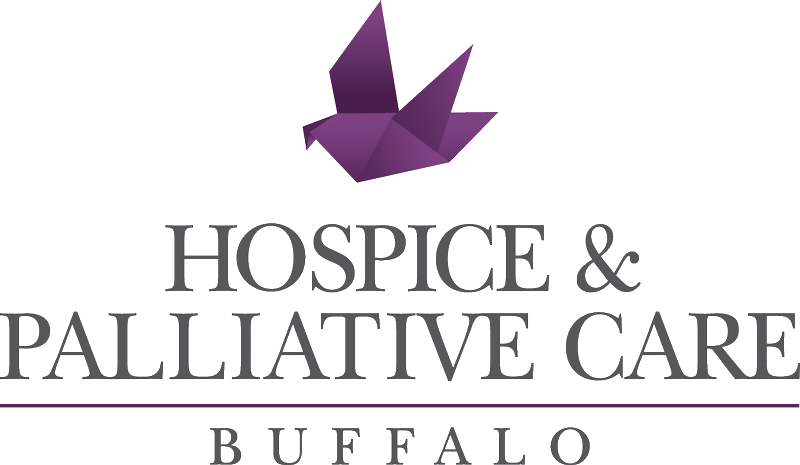Hospice Care
Care for them, comfort for you. We help patients and families when they need it most.

Our Hospice Buffalo program cares for terminally ill individuals who have a life expectancy of six months or less, while providing support and resources to families and caregivers. Hospice care focuses on comprehensive (physical, emotional, social and spiritual) care that is tailored to an individual’s needs and wishes.
For over 40 years, our compassionate team of experts has provided comfort, guidance, and support to residents in Erie County, ensuring quality of life is the best it can be.
Hospice Care is:
- a philosophy of caring, which focuses on helping those with terminal illness live life fully to maintain dignity and ensure their quality of life is the best it can be.
- comfort-focused medical care that addresses the physical, emotional and spiritual stresses associated with advanced illness.
- a healthcare benefit and an entitlement for those faced with life-limiting illness.

The Hospice Care Team
An interdisciplinary team of experts will address the unique needs of each patient while also supporting their loved ones:
- Doctor
- Registered nurse
- Social worker
- Spiritual care counselor
- Home health aides
- Expressive therapists
- Trained volunteers
- Bereavement counselor
- 24/7 access to request assistance
- Clinicians with comprehensive hospice training
Myths vs. facts about hospice care
Myth
Fact
Myth
Fact
Myth
Fact
Hospice care is designed to respect the wishes of an individual faced with a life-limiting illness when curative treatment may no longer be an option. Care plans are specifically developed to address the patient’s pain and symptoms in a coordinated effort to reduce stress and anxiety, while still helping to promote comfort.
Most types of healthcare only focus on the patient, but hospice care guides the entire family throughout the end stages of illness, as well as through the grieving process. Caregivers and families receive grief and loss support for 13 months after the loss of their loved one.
Hospice is available to anyone of any age and for those seeking comfort versus curative treatment.
- To qualify for hospice care, a hospice doctor and the individual’s doctor must certify that life expectancy is six months or less. Patients may remain in hospice care longer than six months pending medical review and eligibility.
- Patients may opt out of hospice care should they wish to initiate curative treatment and in time, pending eligibility, the individual can re-enroll in hospice.
- Patients in hospice care may have diseases such as cancer, congestive heart failure, advanced pulmonary disease, end-stage renal disease, end-stage dementia or any other life-limiting illness.
You can call sooner than you think. No one wants to think about, or talk about, serious illness. For that reason, many delay discussions about end-of-life care. If you are asking yourself if or when to call hospice, there is a good chance you or your loved one may already be eligible to receive this specialized care and support. Even if an individual is not currently eligible for hospice care, gathering information prior to a crisis will allow for better advocacy and informed decision making in the future.
You may want to call us when you or a loved one are experiencing:
- Frequent hospitalizations or visits to the emergency room*
* If you have a loved one in the hospital who is struggling with life-limiting illness, ask the hospital team for a “hospice consult,” and one of our hospice liaisons will assist. - Frequent or reoccurring infections
- Significant, unintended weight loss
- Rapid decline in health over past six months, even with aggressive medical treatments
- Uncontrolled pain, shortness of breath, nausea or vomiting
- Decreasing alertness, withdrawal and/or increased sleeping
- An inability to perform tasks of daily living, such as eating, walking, using the bathroom and personal care
- A shift to focus on quality of life, instead of aggressive treatment
Hospice services are covered by Medicare, Medicaid and most private insurance plans. No one is denied hospice care based upon the inability to pay.
- Medications associated with the terminal illness
- Durable medical equipment (such as a hospital bed)
- Physical symptom control (pain, nausea, shortness of breath, etc.)
- Aide services (bathing, dressing, feeding, toileting)
- Psychosocial counseling and support (for the patient and family)
- Spiritual support (for the patient and family)
- Supportive therapies, such as music and massage
- Volunteer support
- Bereavement care for loved ones for 13 months
Hospice care can be provided anywhere a patient considers home, including a private residence, nursing home, assisted living community or a group home.
There are many benefits to receiving hospice care in either a private residence or a long-term care facility. The hospice team is able to add another layer of direct care and support for the patient, their loved ones and caregivers in facility settings. In addition to our pain and symptom management expertise, hospice provides spiritual and emotional support to both the patient and their loved ones. Grief and bereavement services are also available to loved ones for 13 months after their loss.
Hospice & Palliative Care Buffalo’s inpatient unit in Cheektowaga provides inpatient care for respite, as well as care for those with acute symptoms which are identified by a hospice physician. Such stays are short-term, typically 3-5 days.
Both palliative care and hospice care focus on helping to manage symptoms and improve quality of life, but hospice can only begin when it is felt that the individual has a prognosis of six months or less and curative treatment of the disease has stopped; palliative care can begin much earlier, even at the time of diagnosis and while receiving treatment. The key differences between hospice and palliative care include insurance coverage and when and where the support is provided.
Our team of hospice and palliative care professionals are here to help guide and support you. Contact us by phone at 716-686-8077 or click here to ask a question or to request assistance. We are here for you.
